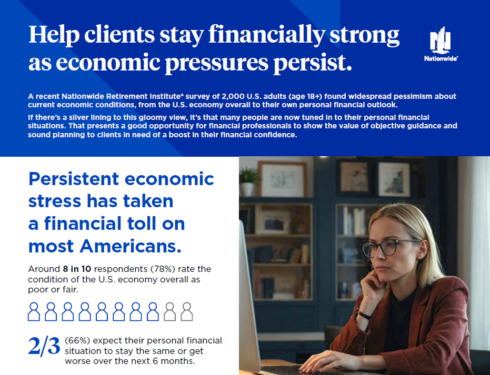Helping clients understand good debt vs. bad debt
Being able to communicate the distinction between good debt and bad debt is crucial for helping clients achieve their long-term goals.

The overwhelming majority of those participating in a recent Nationwide Retirement Institute® survey have a gloomy outlook on the economy—a perspective that isn’t necessarily supported by current economic data. This contrast presents an urgent need for financial professionals to provide proactive reassurance and guidance so investors can stay focused on their long-term goals.
The recent survey revealed this finding and other insights on investors’ top financial concerns and priorities. Kathy Bostjancic, Chief Economist for Nationwide, and Kristi Martin Rodriguez, Senior Vice President of Nationwide Retirement Institute®, provided their thoughts on investors’ current states of mind and how financial professionals can help to keep their clients’ financial plans on track.
Kathy Bostjancic: By many measures, the economy is doing great. The unemployment rate is low, which means most workers have steady jobs and are seeing good wage increases. This is supporting spending activity, which has helped to extend the economic expansion. In fact, the economy has grown by 3.0% over the past year—a faster pace than typical.
Despite these positive trends, there are several big challenges for households right now—especially rising prices and higher interest rates. This has made many consumers feel that they’re falling behind since their wages aren’t going as far as expected.
That said, we feel that negative perceptions about the economy may be overblown, as this remains a positive overall environment. We see inflation continuing to slow, which should allow incomes to catch up to price increases over time.
Kristi Martin Rodriguez: As Kathy mentions, there are certainly some challenges for consumers right now, even though the overall economic picture is generally positive. Regardless of the economy’s current and future state, though, it’s important that consumers keep a long-term outlook when making investment decisions. The economy, after all, is inherently cyclical, and most people invest for goals like retirement that are many years (even many decades) away. During that time, they’ll experience multiple cycles of economic expansion and contraction.
Making financial decisions based on short-term economic conditions or concerns can lead to missed opportunities and potential losses. For instance, pulling out of investments during a downturn can lock in losses and prevent clients from benefiting from eventual market recoveries. By maintaining a long-term perspective, consumers may avoid these pitfalls and work toward achieving their financial goals with greater confidence and stability.

KMR: Prioritizing saving when so many costs are rising is understandably tough. As a financial professional, it’s important that you empathize with the stress this struggle creates when working with clients. Then you can remind them that saving regularly is key to achieving their long-term financial goals and offer to help them find a way to do that.
For example, you could help them analyze their income and expenditures to identify areas where spending can be optimized without compromising essential needs. This might involve recommending cost-saving measures, like cutting discretionary spending or finding more affordable alternatives. By prioritizing savings and ensuring a portion of income is consistently allocated towards long-term goals, clients can better navigate economic pressures without sacrificing their future financial security.
One practical tip you can give clients is to plan with the end in mind. Encourage them to remain disciplined and steadfast in pursuing their long-term financial goals, whether that is saving for retirement, buying a home, or building an emergency fund. Regularly revisiting their financial plan and making adjustments as necessary can help maintain focus and prevent drifting away from the desired outcomes.
KB: Unfortunately, housing inflation is tied to a longer-run imbalance between the supply and demand of housing. The amount of home and apartment construction since the housing market crisis of the 2000s has not kept up with underlying housing needs. Current market conditions, with higher mortgage rates pushing some consumers back into rental housing, have only exacerbated this longer-term issue.
Since the availability of land, labor and construction inputs can be limited and expensive, we expect the incoming supply of new homes and apartments to continue to lag demand—meaning that housing costs could remain higher and “sticky” for some time. This pushes up overall inflation measures and keeps adding pressure to many household budgets.
KB: We no longer expect a recession to occur in 2024. The continued momentum for job growth and consumer spending should extend into the second half of 2024, preventing negative real GDP growth and pushing off recession concerns. We do project growth to slow from over the rest of 2024 but not enough to constitute a recession.
There are recession risks for 2025 and beyond, however. Chief among those risks is an extended period of higher interest rates from the Fed. Currently, we don’t see the Fed starting to lower rates until late in 2024 with some concern that policy easing could be delayed into 2025. This extended period of higher interest rates increases the odds that consumer and business activities drop substantially over the next year, which could cause a recession for the U.S. economy.
KMR: Financial markets are influenced by a lot of different factors—many of which are outside the control of any single administration. And while elections can introduce short-term volatility due to uncertainty and speculation, the long-term performance of investments is typically driven by broader economic fundamentals rather than the political party in power.
Additionally, it’s important to recognize that policy changes take time to implement, and their effects on the economy and markets are often gradual. Basing investment strategies on sound financial principles and individual goals, rather than short-term political developments are considerations you may want to offer your clients. As a financial professional, you can encourage your clients to keep their focus on the long-term plan instead of getting distracted by the latest political news.
To help clients stay focused on their long-term financial goals despite their pessimistic views on the economy, emphasize the importance of maintaining a disciplined, well-diversified portfolio. Remind them of the long-term benefits of staying the course and avoiding emotional, short-term reactions to market fluctuations. Provide personalized guidance and reassurance—highlighting historical data and the resilience of long-term investment strategies to keep them aligned with their financial objectives.
This material is not a recommendation to buy or sell a financial product or to adopt an investment strategy. Investors should discuss their specific situation with their financial professional.
Except where otherwise indicated, the views and opinions expressed are those of Nationwide as of the date noted, are subject to change at any time and may not come to pass.
Investing involves market risk, including possible loss of principal, and there is no guarantee that investment objectives will be achieved. Diversification does not assure a profit or protect against loss in a down market.
The content of this piece is provided for informational purposes only and should not be construed as investment, tax or legal advice. Nationwide and its representatives do not give legal or tax advice. An attorney or tax advisor should be consulted for answers to specific questions.
Nationwide Investment Services Corporation (NISC), member FINRA, Columbus, Ohio. . The Nationwide Retirement Institute is a division of NISC
Nationwide, the Nationwide N and Eagle and Nationwide is on your side are service marks of Nationwide Mutual Insurance Company.
© 2024 Nationwide
NFM-23974AO